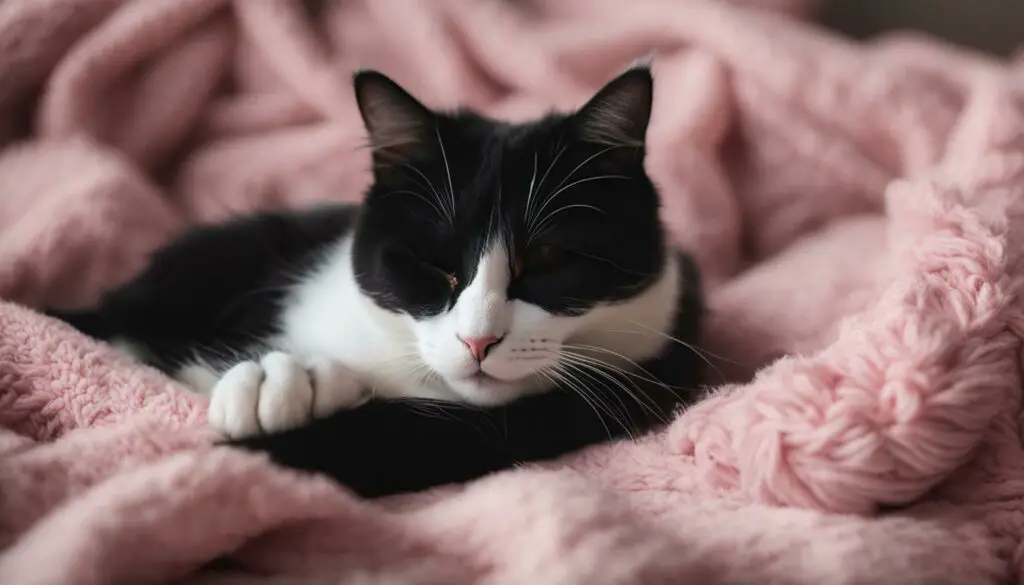Have you ever noticed your cat sleeping with their tongue sticking out? It’s undeniably adorable, but it’s also worth understanding the potential reasons behind this behavior.
Key Takeaways:
- Sleeping with the tongue out is often just a cute quirk and not a health concern.
- Deep relaxation can cause a cat’s mouth to open slightly, leading to their tongue protruding during sleep.
- Cats may also stick their tongues out to facilitate easier breathing, especially in sleep positions that may obstruct normal breathing patterns.
- However, not all cats sleep with their tongues sticking out, and it can vary from cat to cat.
- If a cat seems agitated, is sticking their tongue out with an open mouth or panting, it could indicate distress and should be evaluated by a veterinarian.
Understanding Cat Sleep Positions
Cats have a unique way of sleeping, often curling up into tight balls or stretching out in the most unexpected positions. Their sleeping habits can be quite fascinating to observe, and understanding their different sleep positions can provide insights into their overall behavior and health. Let’s take a closer look at some common cat sleep positions:
- The Ball: One of the most common sleep positions is when cats curl themselves tightly into a ball. This position helps to conserve body heat and provides a sense of security.
- The Loaf: Cats often tuck their paws underneath their bodies, resembling a loaf of bread. This position allows them to quickly spring into action if needed.
- The Stretch: Some cats love to stretch out their bodies when they sleep, often extending their limbs to their full length. This position helps them relax their muscles and release tension.
- The Belly Up: When a cat lies flat on their back with their belly exposed, it’s a sign that they feel completely safe and trust their surroundings. This position also allows them to cool down by exposing their less furry belly to the air.
- The Spoon: Cats can form close bonds with their human companions, and when they sleep next to their owners, they may adopt a “spooning” position. This position shows their affection and desire for closeness.
These are just a few examples of the various sleep positions that cats may adopt. It’s important to note that not all cats sleep with their tongues sticking out, and sleeping with the tongue out can vary from cat to cat. However, it is normal for a just awakened cat to still have their tongue sticking out. If you notice your cat sleeping peacefully and their mouth is still and relaxed, there is typically nothing to worry about.
Featuring a Cute Cat Sleep Position:
As we explore cat sleep positions, here’s a delightful image capturing a cat snoozing in the “Belly Up” position:
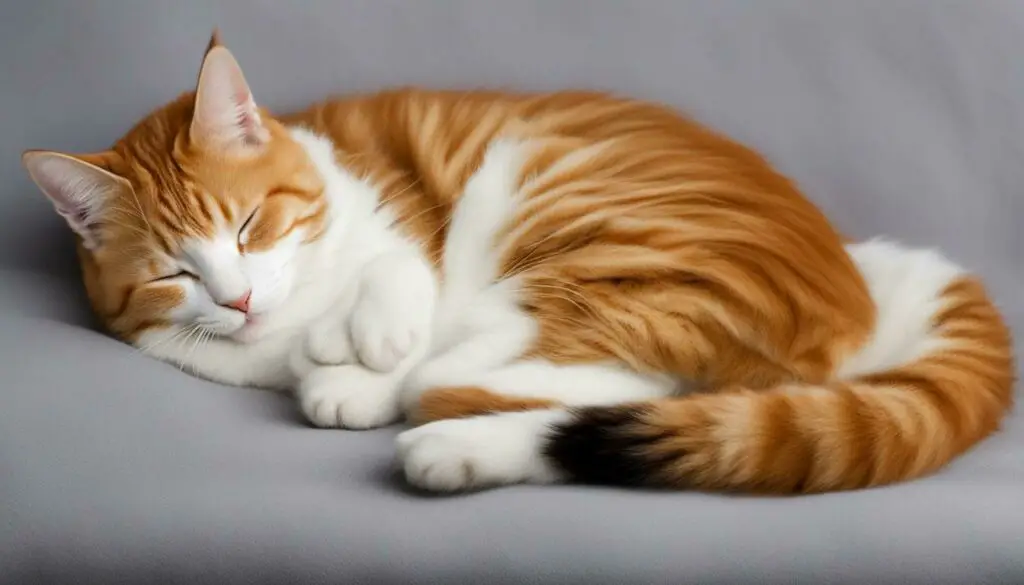
| Position | Description |
|---|---|
| The Ball | Cat curls up tightly into a ball to conserve heat and feel secure. |
| The Loaf | Cat tucks paws underneath the body, resembling a loaf of bread. |
| The Stretch | Cat extends its body fully, releasing tension and relaxing muscles. |
| The Belly Up | Cat lies on its back with belly exposed, indicating a sense of safety and trust. |
| The Spoon | Cat sleeps next to its human companion, displaying affection and a desire for closeness. |
Remember, cats have their own unique preferences and personalities, so their sleep positions can vary. If you have any concerns about your cat’s sleep behavior or notice any signs of distress, it’s always a good idea to consult with a veterinarian for professional advice.
The Normality of Tongue Out Sleeping
If you often find your cat sleeping peacefully with their tongue out, rest assured that it’s often just a normal quirk that many cats exhibit. When a cat is deeply relaxed during sleep, their jaw may loosen, causing their mouth to slightly open and their tongue to fall out. It’s a charming sight that showcases their complete relaxation and contentment.
Some cats may even stick their tongues out slightly while sleeping to facilitate easier breathing. This is particularly true if they are in a sleep position that may obstruct normal breathing patterns. By allowing their tongue to protrude, they create a clear airway, ensuring a steady flow of oxygen as they drift into dreamland.
It’s important to note that not all cats sleep with their tongues sticking out, and it can vary from cat to cat. Some may rarely exhibit this behavior, while others may do it frequently. It’s just another unique aspect of their individual personalities.
To better understand why cats sleep with their tongues out, it’s helpful to observe their overall sleep patterns. If your cat is sleeping peacefully and their mouth is still and relaxed, there is typically no cause for concern. It’s only when the cat seems agitated, sticks their tongue out with an open mouth, or starts panting that you should pay closer attention.
In some cases, a cat sleeping with their tongue out can indicate an underlying health concern. Oral discomfort, dental diseases, or an object in the mouth can cause a cat to sleep with their tongue protruding. If you notice any other signs such as drooling, reluctance to eat, or pawing at the mouth, it’s important to consult a veterinarian for a thorough examination.
Remember, cats are individuals, and their sleeping habits can vary. As long as your cat is sleeping peacefully and their tongue out sleeping is an occasional occurrence, there is typically nothing to worry about. Embrace and appreciate this adorable quirk that makes your feline companion even more endearing.
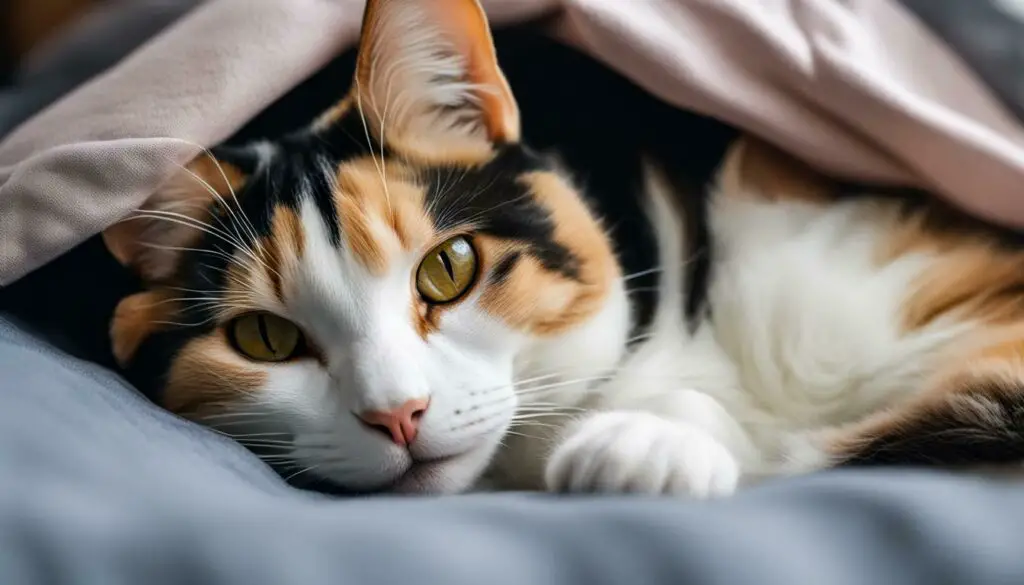
Deep Relaxation and Tongue Protrusion
When a cat is in a deep state of relaxation during sleep, their jaw muscles may relax, causing their mouth to open slightly and their tongue to fall out. This is a perfectly normal behavior and is often seen in cats who are experiencing a deep and restful sleep.
During this state of deep relaxation, a cat’s body enters a state of complete calm, enabling them to fully unwind and recharge. It’s common to see their muscles relax, their breathing become slow and steady, and their tongue gently protrude from their mouth.
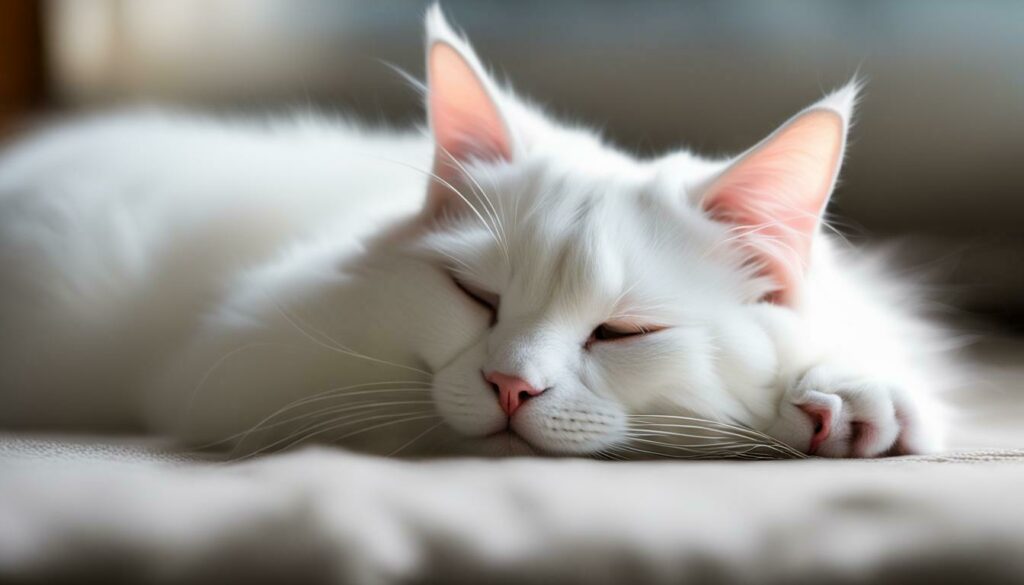
This adorable sight can be attributed to the cat’s natural instinctual behavior. When a cat feels completely safe and at ease, their body automatically relaxes, allowing them to enter into a state of deep sleep. As they sleep, their tongue may fall out as a result of their relaxed jaw muscles, creating a heartwarming picture that many cat owners find endearing.
During this phase of deep relaxation, it’s important to give your cat the space and tranquility they need to fully enjoy their peaceful rest. Avoid waking them abruptly or trying to adjust their tongue position, as it may disrupt their sleep cycle and cause unnecessary stress.
If you observe your cat sleeping with their tongue out and they appear peaceful and content, there is usually no need for concern. It’s simply their way of letting you know that they are experiencing a deep and undisturbed slumber. As a responsible cat owner, it’s important to respect their personal sleep preferences and provide them with a cozy and comfortable environment where they can continue to enjoy their feline naps.
Facilitating Breathing During Sleep
Cats are known for their ability to find the most comfortable sleeping positions, and sometimes sticking their tongues out slightly can help them breathe more easily. This behavior is particularly common when a cat is in a deep sleep, as their jaw muscles relax, causing their mouth to slightly open and their tongue to protrude. It’s their way of ensuring optimal airflow while they rest peacefully.
While not all cats sleep with their tongues sticking out, it can be a normal variation in sleep behavior. Some cats may also adjust their sleeping position to facilitate better breathing. For example, if a cat is sleeping in a position where their nose is partially obstructed, they may stick their tongue out slightly to open up their airways and improve airflow.
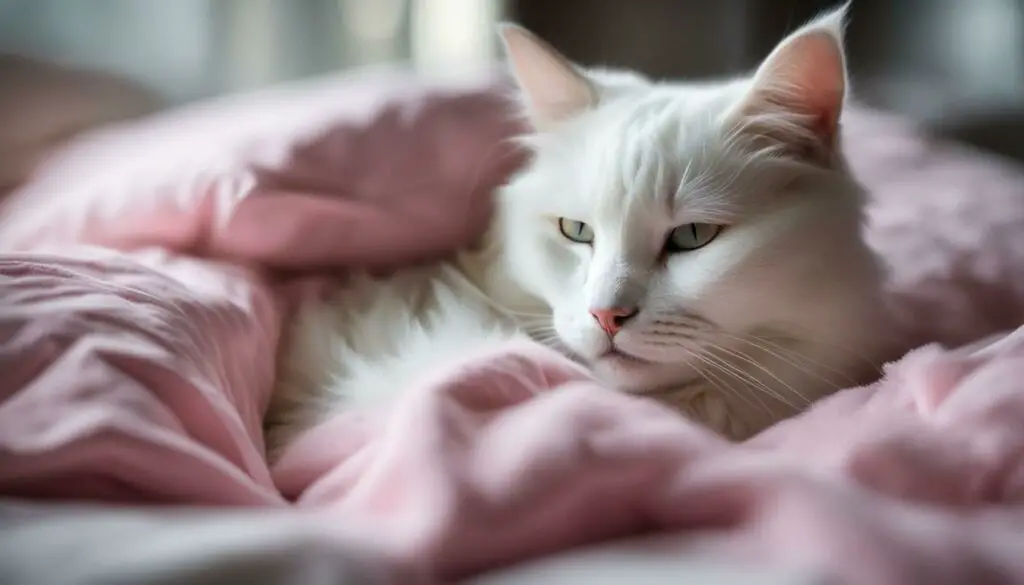
| Sleep Position | Tongue Position |
|---|---|
| Curled up on the side | Tongue may be tucked in |
| Flat on the back | Tongue may be out, facilitating breathing |
| Curled up in a ball | Tongue may be partially out |
It’s important to note that if your cat is sleeping peacefully and their mouth is still and relaxed, there is typically nothing to be concerned about. However, if you notice your cat sticking their tongue out with an open mouth, panting excessively, or seeming agitated, it could indicate distress. In such cases, it’s advisable to consult a veterinarian to rule out any underlying health issues.
When to Be Concerned
While it’s usually nothing to worry about, there are certain situations where a cat sleeping with their tongue out may be a cause for concern. As a cat owner, it’s important to be aware of the red flags that could indicate an underlying issue.
One such sign is if the cat appears agitated or is constantly sticking their tongue out with an open mouth. This could suggest that they are experiencing distress or discomfort. Panting, which is abnormal for cats, can also be a cause for concern if it accompanies the tongue protrusion.
Oral discomfort or dental diseases can also lead to cats sleeping with their tongues out. If your cat has an object stuck in their mouth or is suffering from dental issues, it may affect their sleep positions and cause their tongue to protrude during sleep.

If you notice your cat sleeping with their tongue out and it’s accompanied by other signs such as drooling, reluctance to eat, or pawing at the mouth, it’s crucial to consult a veterinarian. They can examine your cat’s oral health and address any underlying issues that may be causing the behavior.
However, it’s essential to remember that if your cat is sleeping peacefully and their mouth is still and relaxed, there is typically nothing to worry about. Cats have their unique sleep positions and behaviors, and sleeping with the tongue out can simply be their adorable quirk.
Signs of Distress
If your cat seems agitated, is sticking their tongue out with an open mouth, or is panting while sleeping, it could be a sign of distress. While it’s generally normal for cats to sleep with their tongues out, these behaviors may indicate an underlying issue that needs attention. If you notice any of these signs, it’s essential to observe your cat’s overall behavior and monitor for any other concerning symptoms.
One possible reason for distress could be oral discomfort or dental diseases. Cats with dental issues may experience pain or inflammation in their mouths, leading to uncomfortable sleep positions and tongue protrusion. If your cat is sleeping with their tongue out and showing signs such as drooling, reluctance to eat, or pawing at the mouth, it’s important to consult a veterinarian for a thorough examination.
Another cause of distress could be an object lodged in your cat’s mouth. Cats are curious creatures and may accidentally swallow small items that can become stuck, causing discomfort and difficulty in normal sleeping positions. If you suspect your cat has ingested something foreign or notice any unusual behavior, it’s crucial to seek immediate veterinary attention.
Remember, if your cat is sleeping peacefully and their mouth is still and relaxed, there is typically nothing to worry about. However, if you notice any signs of distress or other concerning symptoms, it’s always best to err on the side of caution and consult a veterinarian for proper evaluation and treatment.
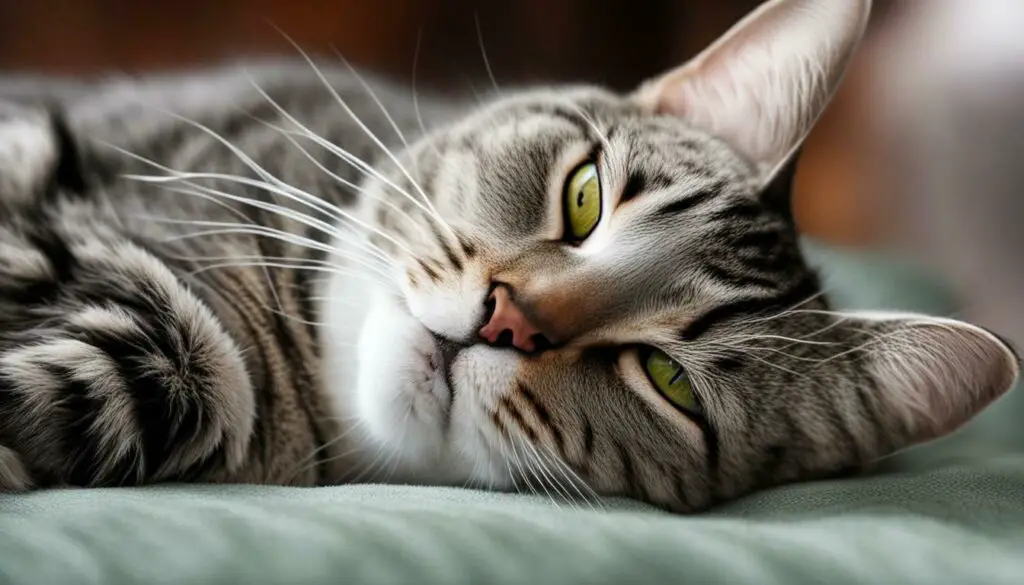
Dental Issues and Oral Discomfort
Oral discomfort, such as dental diseases or an object in the cat’s mouth, can cause them to sleep with their tongue sticking out. Dental diseases, like periodontal disease or tooth decay, can lead to pain and discomfort, making it difficult for cats to close their mouths fully while sleeping. In some cases, foreign objects like pieces of food or small toys can become lodged in the mouth, causing irritation and discomfort that can result in a protruding tongue during sleep.
If you suspect that your cat may be experiencing dental issues or oral discomfort, it’s essential to consult a veterinarian. They can examine your cat’s mouth, perform necessary dental procedures, and provide appropriate treatment to alleviate any pain or discomfort. Regular dental check-ups and good oral hygiene practices, such as brushing your cat’s teeth and providing dental-friendly toys or treats, can also help prevent dental problems and reduce the likelihood of your cat sleeping with their tongue out.
To ensure your cat’s dental health, it’s important to pay attention to any signs of dental issues. These signs may include bad breath, drooling, reluctance to eat, pawing or rubbing at the mouth, or swollen or bleeding gums. If you notice any of these symptoms, it’s best to seek veterinary assistance promptly. Remember, maintaining good oral health is crucial for your cat’s overall well-being and can contribute to their comfort during sleep.
| Signs of Dental Issues and Oral Discomfort | Action |
|---|---|
| Bad breath | Schedule a dental check-up with a veterinarian |
| Drooling | Examine your cat’s mouth for any abnormalities or foreign objects |
| Reluctance to eat | Monitor your cat’s eating habits and consult a veterinarian if the behavior persists |
| Pawing or rubbing at the mouth | Inspect your cat’s mouth for signs of swelling, bleeding, or discomfort |
| Swollen or bleeding gums | Seek veterinary assistance for a thorough examination and appropriate treatment |
Keeping Your Cat’s Mouth Healthy
Preventing dental issues and promoting good oral hygiene can go a long way in ensuring your cat’s overall well-being. Here are some tips to help keep your cat’s mouth healthy:
- Brush your cat’s teeth regularly using a cat-specific toothbrush and toothpaste recommended by your veterinarian. Start slowly and be patient, as it may take time for your cat to get used to the process.
- Provide dental-friendly toys and treats that can help promote healthy teeth and gums. Look for products that have been approved by veterinary professionals.
- Offer a balanced diet that includes proper dental care, such as dental kibble or dental treats that help clean teeth while your cat eats.
- Schedule regular dental check-ups with your veterinarian to monitor your cat’s dental health and address any issues promptly.
By taking proactive measures to care for your cat’s oral health, you can minimize the chances of them sleeping with their tongue out due to dental issues or oral discomfort. Remember to observe any changes in behavior or signs of distress and consult a veterinarian if needed. With proper dental care, your furry friend can enjoy peaceful sleep and maintain a healthy, happy life.
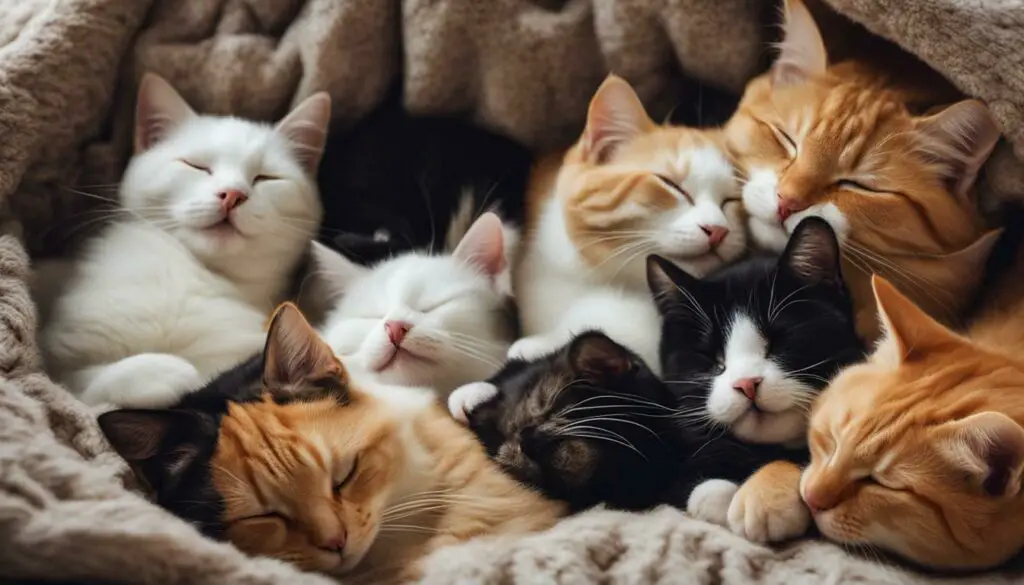
Consulting a Veterinarian
If your cat’s tongue out sleeping is coupled with other signs, such as drooling, reluctance to eat, or pawing at the mouth, it’s advisable to seek veterinary assistance. These symptoms may indicate that there is an underlying issue that requires attention. A veterinarian will be able to examine your cat and determine the cause of their tongue protrusion during sleep.
During the visit, the veterinarian will conduct a thorough examination of your cat’s oral health and overall well-being. They may also perform tests, such as dental X-rays or blood work, to identify any underlying dental diseases or other medical conditions that could be contributing to the tongue out sleeping behavior.
Based on their findings, the veterinarian will develop a treatment plan tailored to your cat’s specific needs. This may include dental treatments, such as cleaning or extractions, or addressing any other oral or medical issues that are causing discomfort. They will also provide recommendations on how to promote good oral health and ensure your cat’s well-being.
Table 1: Common Signs That Warrant a Veterinary Visit
| Signs | Explanation |
|---|---|
| Drooling | Excessive drooling can indicate oral discomfort or dental issues. |
| Reluctance to eat | If your cat is avoiding food or having difficulty chewing, it could be a sign of oral pain. |
| Pawing at the mouth | Constantly pawing at the mouth may suggest oral discomfort or an object stuck in the mouth. |
| Unusual behavior | If your cat appears agitated, is panting, or has difficulty breathing, it may indicate distress and require immediate veterinary attention. |
Remember, if you notice any concerning signs along with your cat’s tongue out sleeping behavior, it’s always better to err on the side of caution and consult a veterinarian. Your cat’s health and well-being should always be a priority, and a professional evaluation can provide the necessary guidance and care.

Peaceful Sleep and Normal Tongue Position
As long as your cat is sleeping peacefully and their mouth is still and relaxed, there’s usually no cause for concern. Many cats exhibit the adorable quirk of sleeping with their tongues out, and it’s often just a cute behavior that adds to their unique charm. When a cat is deeply relaxed during sleep, their jaw may naturally relax as well, causing their mouth to slightly open and their tongue to fall out. This is completely normal and harmless.
Some cats may also stick their tongues out slightly while sleeping to facilitate easier breathing. This can be especially true if they are in a sleep position that may obstruct normal breathing patterns. It’s their way of ensuring a steady flow of air, allowing them to sleep comfortably. However, it’s important to note that not all cats sleep with their tongues sticking out, and the extent to which the tongue protrudes can vary from cat to cat.
If your cat has just awakened from a nap with their tongue sticking out, there’s no need to worry. This is a common occurrence as they transition from a deep sleep to a wakeful state. As long as they appear calm and settled, with no other signs of distress, you can rest assured that they are simply enjoying a peaceful slumber.
| Signs of Distress: | When to Consult a Veterinarian: |
|---|---|
| – Agitation | – Tongue sticking out with an open mouth |
| – Panting | – Excessive drooling |
| – Pawing at the mouth | – Reluctance to eat |
If your cat is displaying any of the signs of distress listed in the table, it’s essential to consult a veterinarian. These signs may indicate an underlying issue, such as oral discomfort, dental diseases, or the presence of an object lodged in their mouth. Your veterinarian will be able to assess your cat’s health and provide appropriate guidance and treatment if necessary.
Overall, a sleeping cat with their mouth gently closed or a tongue slightly protruding is usually a sign of deep relaxation and contentment. Embrace their individuality and enjoy the adorable sight of your feline companion indulging in a peaceful slumber.
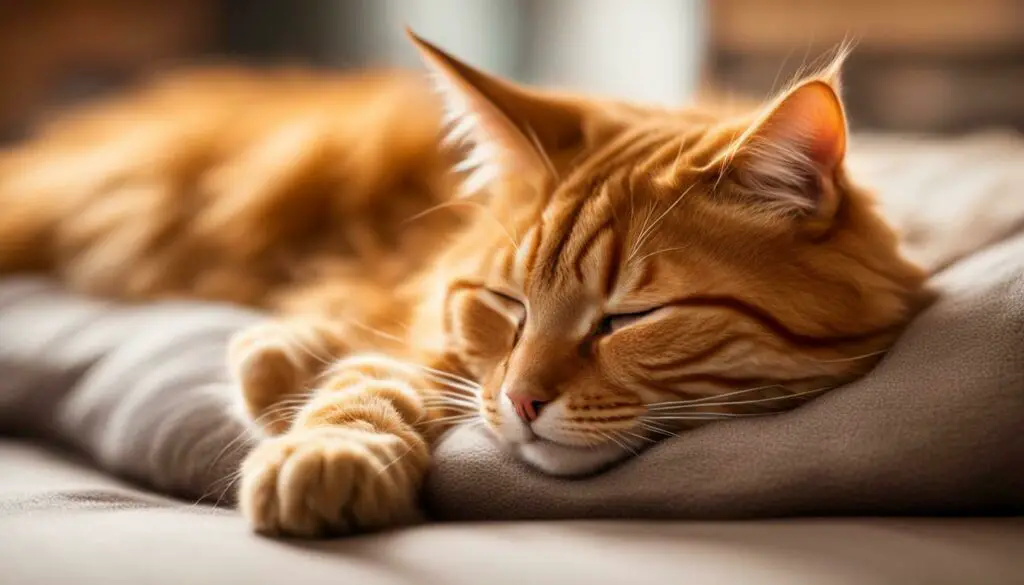
Promoting Good Oral Health
Maintaining good oral health is essential for your cat’s overall well-being, and it can also help prevent them from experiencing oral discomfort that may lead to tongue-out sleeping. Here are some tips to keep your feline friend’s teeth and mouth in tip-top shape:
- Regular brushing: Just like humans, cats can benefit from regular teeth brushing. Use a soft-bristled toothbrush and special cat-friendly toothpaste to gently clean your cat’s teeth. Start slowly and gradually increase the duration of the brushing sessions as your cat becomes more comfortable.
- Dental treats and toys: Providing your cat with dental treats or toys designed to promote oral health can help keep their teeth clean. Look for products that are specifically designed to reduce plaque and tartar buildup.
- Regular check-ups: Schedule regular dental check-ups with your veterinarian. They can perform a thorough examination of your cat’s mouth and teeth, identify any potential issues, and provide necessary treatments or recommendations.
- Proper diet: Offering your cat a balanced diet that promotes good oral health can also contribute to their overall dental well-being. Consult with your veterinarian to ensure your cat is receiving the right nutrients for optimal oral health.
Remember, prevention is key when it comes to maintaining your cat’s oral health. By implementing these practices, you can help keep your furry friend’s teeth clean and reduce the likelihood of them experiencing oral discomfort that may lead to tongue-out sleeping.
Promoting Good Oral Health
Maintaining good oral health is essential for your cat’s overall well-being, and it can also help prevent them from experiencing oral discomfort that may lead to tongue-out sleeping. Here are some tips to keep your feline friend’s teeth and mouth in tip-top shape:
- Regular brushing: Just like humans, cats can benefit from regular teeth brushing. Use a soft-bristled toothbrush and special cat-friendly toothpaste to gently clean your cat’s teeth. Start slowly and gradually increase the duration of the brushing sessions as your cat becomes more comfortable.
- Dental treats and toys: Providing your cat with dental treats or toys designed to promote oral health can help keep their teeth clean. Look for products that are specifically designed to reduce plaque and tartar buildup.
- Regular check-ups: Schedule regular dental check-ups with your veterinarian. They can perform a thorough examination of your cat’s mouth and teeth, identify any potential issues, and provide necessary treatments or recommendations.
- Proper diet: Offering your cat a balanced diet that promotes good oral health can also contribute to their overall dental well-being. Consult with your veterinarian to ensure your cat is receiving the right nutrients for optimal oral health.
Remember, prevention is key when it comes to maintaining your cat’s oral health. By implementing these practices, you can help keep your furry friend’s teeth clean and reduce the likelihood of them experiencing oral discomfort that may lead to tongue-out sleeping.
| Benefits of Good Oral Health | Consequences of Poor Oral Health |
|---|---|
| Prevents dental diseases like gingivitis and periodontal disease | Increased risk of tooth decay and tooth loss |
| Fresher breath | Bad breath |
| Improved overall health and well-being | Pain and discomfort |
“A healthy mouth leads to a happy cat. By taking care of your cat’s oral health, you can ensure they lead a comfortable and contented life.”
By following these tips and prioritizing your cat’s oral health, you can help promote a healthy mouth and reduce the likelihood of them experiencing oral discomfort that may lead to tongue-out sleeping. Remember to consult with your veterinarian for personalized advice and recommendations.
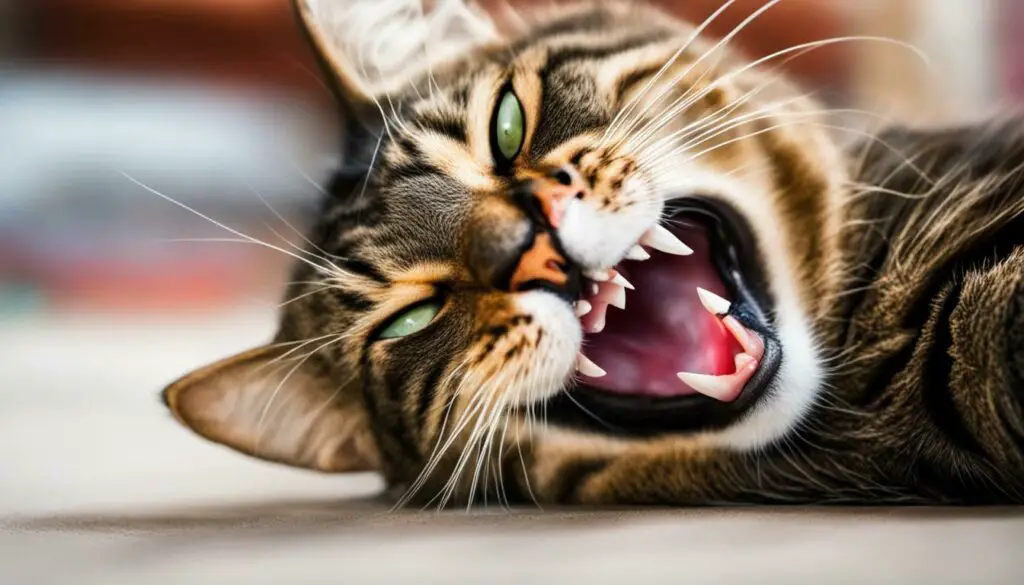
Normalizing the Quirk
Sleeping with the tongue out is just another endearing quirk that makes our cats even more lovable and special. While not all cats sleep with their tongues sticking out, it is a behavior that can be seen in many feline companions.
When a cat is deeply relaxed during sleep, their jaw may relax as well, causing their mouth to slightly open and their tongue to fall out. This is completely normal and harmless. It’s a sign that your cat is completely at ease and enjoying a peaceful slumber.
Some cats may also stick their tongues out slightly while sleeping to facilitate easier breathing. This is especially true if they are in a sleep position that may obstruct normal breathing patterns. It’s their way of ensuring that they can breathe comfortably even while they’re fast asleep.
However, it’s important to note that there are instances where sleeping with the tongue out may indicate an underlying health concern. If your cat seems agitated, is sticking their tongue out with an open mouth, or is panting, it could be a sign of distress. In such cases, it’s best to consult a veterinarian to rule out any potential issues.
Overall, if your cat is sleeping peacefully and their mouth is still and relaxed, there is typically nothing to worry about. Embrace and appreciate this adorable quirk that makes your furry friend unique. After all, it’s just one of the many endearing traits that make cats such delightful companions.
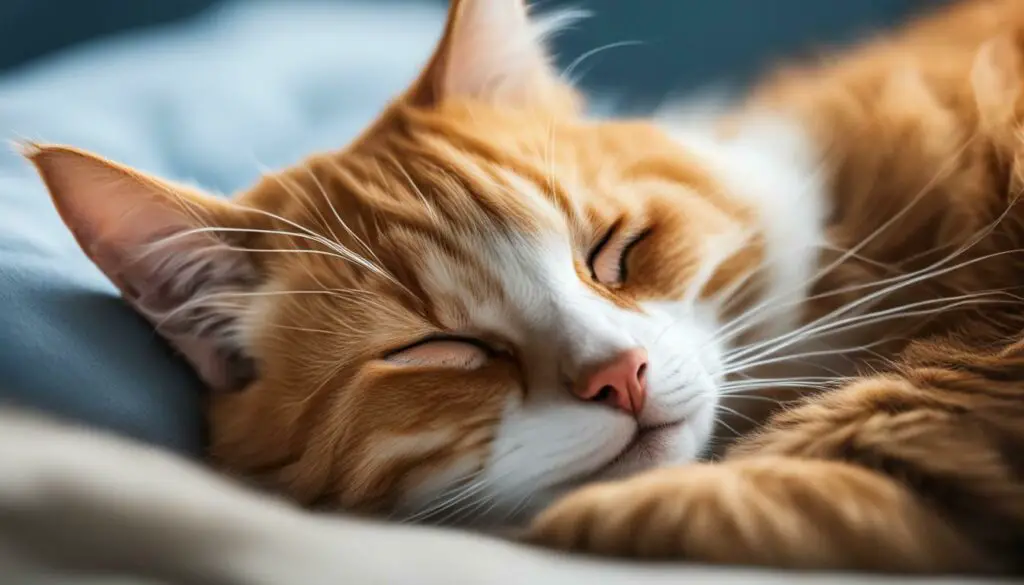
| Reasons for Cats Sleeping with Tongue Out | Description |
|---|---|
| Deep relaxation | During deep sleep, a cat’s jaw may relax, causing the mouth to slightly open and the tongue to fall out. |
| Facilitating breathing | Some cats stick their tongues out slightly to facilitate easier breathing, especially if they are in a sleep position that may obstruct normal breathing patterns. |
| Normal variation | Not all cats sleep with their tongues sticking out, and it can vary from cat to cat. It is normal for a just awakened cat to still have their tongue sticking out. |
| Signs of distress | If a cat seems agitated, is sticking their tongue out with an open mouth, or is panting, it could indicate distress and requires veterinary attention. |
| Oral discomfort and dental issues | Oral discomfort, dental diseases, or an object in the mouth can cause a cat to sleep with its tongue protruding. These issues may be accompanied by other signs such as drooling, reluctance to eat, or pawing at the mouth. |
Conclusion
By understanding the reasons behind cats sleeping with their tongues out and knowing when to seek veterinary attention, we can ensure our feline friends live their happiest and healthiest lives.
Sleeping with the tongue out is often just a harmless and cute quirk that many cats exhibit. When a cat is deeply relaxed, their jaw may relax during deep sleep, causing the mouth to slightly open and the tongue to fall out. Some cats may stick their tongues out slightly to facilitate breathing, especially if they are in a sleep position that may obstruct normal breathing patterns. However, not all cats sleep with their tongues sticking out and it can vary from cat to cat.
It is normal for a just awakened cat to still have their tongue sticking out. Concern should arise if the cat seems agitated, is sticking their tongue out with an open mouth or is panting, as that could indicate distress. Oral discomfort, dental diseases, or an object in the mouth can also cause a cat to sleep with its tongue protruding. If this behavior is coupled with other signs such as drooling, reluctance to eat, or pawing at the mouth, a veterinarian should be consulted. Overall, if the cat is sleeping peacefully and their mouth is still and relaxed, there is typically nothing to worry about.
By observing our cats’ behavior and providing the necessary care, we can ensure their well-being and happiness. So, let’s cherish the unique quirks of our feline companions, including when they sleep with their tongues out, and continue to provide them with the love and attention they deserve.
FAQ
Why does my cat sleep with their tongue out?
Cats may sleep with their tongues out as a cute quirk or to facilitate breathing in certain sleep positions. It is usually not a cause for concern.
Is it normal for a cat to have their tongue sticking out when they wake up?
Yes, it is normal for a cat to still have their tongue sticking out after waking up. It should go back to its normal position as they fully wake up and become alert.
When should I be concerned about my cat sleeping with their tongue out?
If your cat seems agitated, is sticking their tongue out with an open mouth, or is panting, it could indicate distress. Additionally, if they show other signs like drooling, reluctance to eat, or pawing at the mouth, consult a veterinarian.
Can dental issues cause a cat to sleep with its tongue protruding?
Yes, dental diseases or oral discomfort can contribute to a cat sleeping with its tongue sticking out. If you suspect dental problems, it is important to have your cat examined by a veterinarian.
When should I consult a veterinarian about my cat’s sleep behavior?
If your cat’s tongue-out sleep behavior is accompanied by signs of distress or other concerning symptoms, it is advisable to consult a veterinarian for a proper evaluation and guidance.
Is it important to promote good oral health in cats?
Yes, promoting good oral health in cats is essential to prevent dental issues and reduce the likelihood of them sleeping with their tongues out. Regular dental care and a proper diet can help maintain healthy teeth and gums.
Should I worry if my cat sleeps peacefully with their tongue out?
If your cat is sleeping peacefully, their mouth is still and relaxed, and they show no signs of distress, there is typically nothing to worry about. Observing their overall sleep patterns can help you gauge their well-being.

